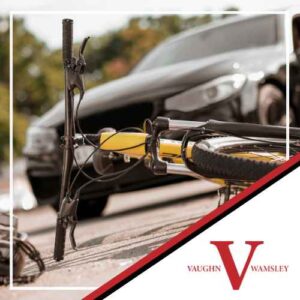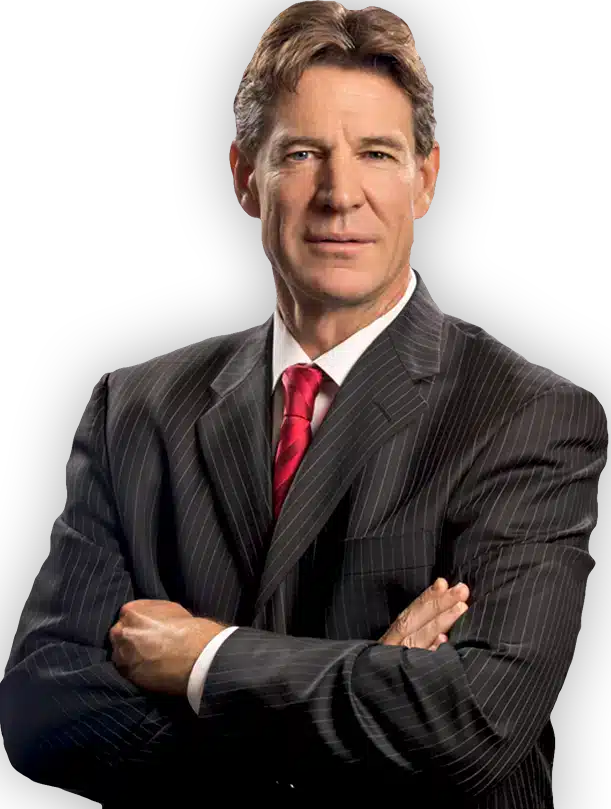Indianapolis Right Hook Bicycle Accident Lawyer

If you or someone you love has been hurt in a right hook accident, it’s important to understand your rights. Vaughn A. Wamsley is passionate about standing up for cyclists. With over three decades of experience, we are dedicated to helping injured cyclists get the compensation they deserve. Our Indianapolis bicycle accident lawyer is here to support you every step of the way.
What is a Right Hook Bicycle Accident?
A right hook bicycle accident happens when a vehicle making a right turn crosses the path of a cyclist traveling straight. These accidents often occur because drivers fail to notice the cyclist or misjudge their speed.
The result can be catastrophic for the rider, who has little protection against the force of a car.
Where Do Right Hook Accidents Occur?
Right-hook accidents can take place in various locations. Some of the most common locations for these accidents that we see here in Indianapolis include:
Intersections
Intersections are among the most frequent sites for right-hook accidents. These occur when a driver turns right without noticing a cyclist continuing straight through the crossing. Lack of attention or failure to yield are common causes of these situations.
Driveways and Parking Lot Exits
Drivers pulling out of driveways or parking lots often focus on oncoming traffic, overlooking cyclists riding along the street or sidewalk. This can lead to sudden collisions when turning right into a cyclist’s path.
Bike Lanes Adjacent to Traffic Lanes
Bike lanes positioned next to vehicle lanes can be particularly dangerous when drivers fail to check for cyclists before making a right turn. Cyclists in these lanes often have limited time to react to a vehicle cutting across their path.
Bus Stops or Loading Zones
Right-hook accidents frequently occur near bus stops or delivery zones. Drivers turning into or out of these areas may not see cyclists riding alongside them, especially in heavy traffic or busy urban settings.
Roundabouts
While less common, roundabouts can also be hazardous for cyclists. Accidents occur when drivers exiting a roundabout cut across the path of a cyclist riding in the outer lane.
Cyclists face heightened risks in these locations due to the limited space and reaction time to avoid turning vehicles. Increased awareness and careful driving can help reduce these dangerous incidents.
Why Are Right Hook Accidents Hazardous for Cyclists?
Cyclists lack the protection of a vehicle, so they often bear the brunt of the impact in a collision. These accidents can throw cyclists onto the road, into traffic, or hard objects like curbs or poles. The injuries sustained can be life-altering, making it crucial to seek compensation and justice.
Causes of Right Hook Bicycle Accidents
We continue to see a significant number of right-hook bicycle accidents in our city for several reasons. Some of the most common include:
Driver Negligence
Right-hook accidents often happen when drivers fail to check their mirrors or blind spots before making a turn. This oversight can leave cyclists no time to react, resulting in severe injuries. Simple habits like double-checking mirrors could prevent many of these crashes.
Distracted Driving
Drivers texting, eating, or adjusting their radios often overlook cyclists. These distractions reduce reaction time and awareness, making right-hook accidents more likely. Staying focused behind the wheel is crucial for everyone’s safety.
Lack of Awareness of Bicycle Laws
Some drivers are unaware that cyclists have the same rights on the road as cars. This lack of knowledge leads to reckless actions, such as cutting off cyclists while turning, creating unnecessary and dangerous situations. Public education on bicycle laws could help reduce these incidents.
Poor Road Conditions
Issues like narrow lanes, potholes, or uneven pavement can force cyclists closer to traffic, increasing the risk of a collision during turns. Addressing these road problems can give cyclists the space to ride safely.
Common Injuries in Right Hook Bicycle Accidents
Right-hook accidents can cause severe injuries that may affect victims for years.
- Broken Bones: Fractures in arms, legs, or ribs often require months of recovery and physical therapy.
- Head and Brain Injuries: Even with a helmet, cyclists may suffer concussions or traumatic brain injuries, leading to memory loss, difficulty concentrating, or permanent disability.
- Spinal Injuries: Damage to the spinal cord can cause paralysis or chronic pain.
- Soft Tissue Injuries: Torn ligaments or muscles can limit mobility and require extensive treatment.
- Lacerations and Abrasions: Deep cuts or road rash can result in permanent scarring and a risk of infection.
- Internal Injuries: Damage to organs from the impact can be life-threatening and may require emergency surgery.
- Emotional Trauma: Many victims experience PTSD, anxiety, or depression after an accident, which can make recovery even harder.
Liability in Right Hook Bicycle Accidents
Determining liability in right-hook bicycle accidents often involves examining the actions of all parties involved. In Indianapolis, several parties may bear responsibility depending on the circumstances of the crash.
Driver Responsibility
Drivers are legally required to yield to cyclists and check for their presence before making a right turn. When they fail to look in their mirrors or blind spots, they often cause collisions that could have been avoided. This failure to exercise caution usually makes drivers liable for the accident.
Cyclist Responsibility
While drivers are frequently at fault, cyclists are also responsible for following traffic laws and clearly signaling their intentions. Adhering to these rules enhances safety and strengthens a cyclist’s case if an accident occurs. Although cyclists are rarely the primary cause, understanding shared road responsibilities is crucial for preventing conflicts.
Establishing liability often requires collecting strong evidence, such as traffic camera footage, witness statements, and accident reconstruction reports. This evidence helps clarify the events leading to the crash and is essential for building a persuasive legal case.
By identifying the responsible parties and gathering the necessary proof, victims of right-hook bicycle accidents can seek justice and hold negligent parties accountable.
Compensation for Bicycle Accident Victims

- Medical expenses
- Lost wages
- Pain and suffering
- Property damage
- Future earning potential loss
- Rehabilitation costs
- Emotional distress
Settlement amounts depend on factors such as the severity of injuries, their impact on daily life, and their long-term effects on earning capacity.
Call Our Indianapolis Right Hook Bicycle Accident Lawyer
If you’ve been injured in a right-hook bicycle accident, you don’t have to face the aftermath alone. Vaughn A. Wamsley understands cyclists’ challenges and is committed to helping you secure the justice and compensation you deserve.
Our team has the knowledge and dedication to handle even the most challenging cases. With our no-win, no-fee right hook bicycle accident lawyer in Indianapolis, you won’t pay unless we win your case.
Call us today for a free consultation. Let us stand by your side and fight for the compensation you need to move forward.
Why You Should Choose Vaughn Wamsley Law Firm.
See What Your Case Is Worth!You Don’t Pay Unless We Win
- $100 Million Won for Clients. And Counting.
- 10,000 Accident Victims Helped.
- A Top Indiana Law Firm.
- Track Record of Winning.
- You Don’t Pay Unless We Win.
- 30 Years Experience.
- Vaughn Was Injured Too. He Knows What You’re Going Through.
Copyright © 2024 Vaughn A. Wamsley. All rights reserved.


